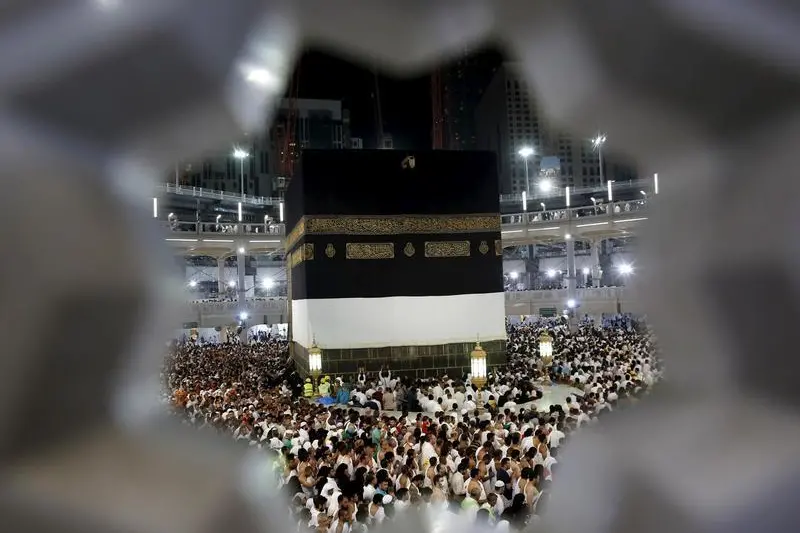PHOTO
Monday, Aug 21, 2017
On the first day of the Eid Al-Adha holiday, 20,000 Qatari pilgrims will start their annual hajj pilgrimage, thanks to an initiative recently taken by King Salman of Saudi Arabia and Crown Prince Mohammad Bin Salman. The Saudi monarch ordered seven chartered Boeing 777s to fly Qatari pilgrims from Doha to the port city of Jeddah, from where they will then head to the holy city of Mecca. The Saudi government has also reopened the border crossing of Salwa, the only overland connection between the two countries, which has been sealed off since the current crisis erupted in early June. Qatari nationals wanting to drive to Mecca are welcome to do so. Riyadh has also waived the usual electronic permits issued to pilgrims, further facilitating hajj for the Qataris. This is a gesture of goodwill aimed at the people of Qatar. Despite major political differences with Doha, King Salman remains highly committed to his tiny neighbour and its people, who are not to blame for the malpractices of their ruling class. Saudi Arabia did not take similar measures with Syrian pilgrims, for example, wanting to make the annual journey since Riyadh broke off its relations in 2011 — making a point that Qatar is indeed different when it comes to Riyadh.
The Saudi move was arranged at a high profile meeting between Mohammad Bin Salman and Sheikh Abdullah Bin Ali Al Thani, a Qatari royal who is being marketed as an emir-in-waiting, once/if Tamim is forced to step down. It came as a direct response to claims that Saudi Arabia had “politicised” the hajj and banned Qataris from attending, a complaint put in writing and submitted to the United Nations. Another memo was lodged with Unesco, accusing Riyadh of “harassing” Qatari nationals. Much of its rhetoric was ripped straight out of similar memos filed by Qatar’s Iranian allies back in September 2015, after a tragic stampede led to the killings of over 2,000 pilgrims, including the former Iranian Ambassador to Beirut. Iran itself has often politicised the hajj pilgrimage to advance its personal agenda, pretty much like Qatar is doing today, only far more radically. In 1980, Iranian pilgrims, believed to be agents of the secret service, staged a demonstration in front of Al-Masjid Al Nabawi in Medina, carrying photos of Ayatollah Khomeini one year after he had staged his 1979 Islamic Revolution. They did it again in 1987, only this time in Mecca, causing a stampede that led to the death of 1,400 pilgrims. In 1982 and 1986 Iranian pilgrims were arrested carrying guns and explosives and in every single incident, Tehran accused Saudi Arabia of persecuting them because of their religious background.
To avoid such occurrence, Riyadh had initially put two major restrictions on the hajj, which have provoked Tamim supporters on Facebook and Twitter. One was that any Qatar national around the world wanting to make the holy pilgrimage had to do so strictly through Doha — he/she could travel directly to Saudi Arabia from Europe, the US, or any country in the Middle East. Also, they could use any airline in the world except for Qatar Airways, which was blacklisted in Saudi Arabia and other Gulf countries earlier this summer. The Saudi restrictions were only natural after all, because Qatari citizens affiliated with terrorist groups like Jabhat Al-Nusra or Daesh are scattered across the Arab World, mainly in Iraq and Syria, and might use the hajj as a Trojan horse to smuggle into Saudi Arabia, possibly to carry out a terrorist operation during the pilgrimage. Yet they seem to have provoked a large number of Qataris, who argued that they ought to be allowed to make the trip with their own money on their own national airline. The Qatari Ministry of Endowments and Islamic Affairs said that the Saudi restrictions are designed to “set obstacles for the pilgrims”
Since the Saudi announcement has been made, Qatari officials have been silent, distancing themselves from it due to the high profile positioning of Abdullah Bin Ali. Undoubtedly they were taken aback by the royal gesture and certainly did not want it to happen — preferring instead to continue using and abusing the hajj story in their media war against the kingdom. Tamim was further belittled by the Saudi royals, first for not lifting a finger to facilitate the hajj for his countrymen, and secondly, for letting Abdullah Bin Ali do the job on his behalf. By allowing Qataris to make the trip, Riyadh has actually deprived him of a very effective propaganda tool that Al Jazeera TV was trumpeting day and night. Doha’s latest decision to not grant landing permission to Saudi Arabian Airlines speaks volumes about the country’s intransigence and obstinacy.
By Sami Moubayed | Correspondent
Gulf News 2017. All rights reserved.





















